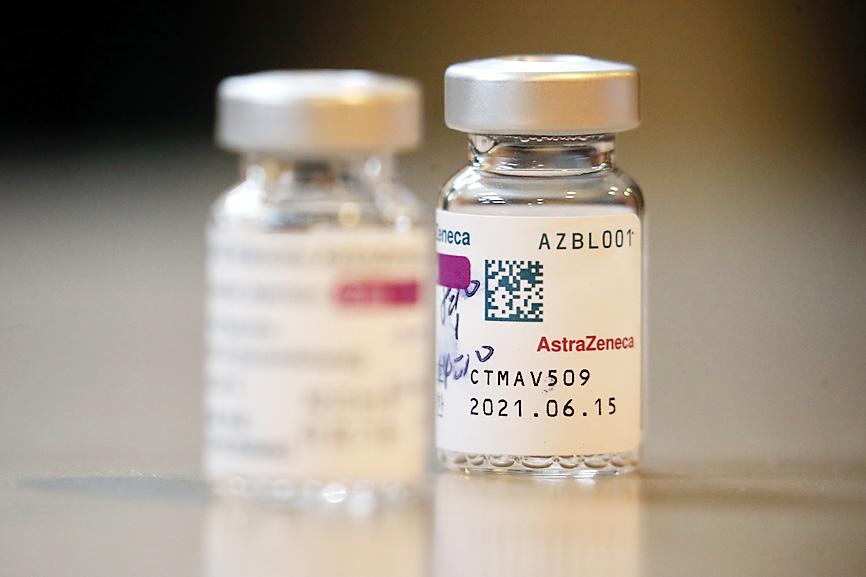The Central Epidemic Command Center (CECC) yesterday said it would release another 10,000 doses of the AstraZeneca COVID-19 vaccine for self-pay vaccinations.
Centers for Disease Control (CDC) Deputy Director-General Chuang Jen-hsiang (莊人祥), who is the CECC’s spokesman, said that 7,165 people had received a self-pay vaccine shot as of Monday.
Self-pay vaccinations were made available on Wednesday last week for people who are planning to travel abroad for business, work, study or medical treatment, and 10,000 doses were initially released.

Photo: Ritchie B. Tongo, EPA-EFE
Chuang said those doses are likely to be used up in a couple of days, while another 7,909 people have made appointments with hospitals to get vaccinated between yesterday and Saturday.
Following Chuang’s remarks, Minister of Health and Welfare Chen Shih-chung (陳時中), who heads the CECC, announced that the center would release another 10,000 doses of the vaccine for self-pay vaccinations.
Based on the number of government-funded shots administered on Monday, it appears that a spate of infections among China Airlines pilots has not boosted people’s willingness to get vaccinated, so there are sufficient doses to be released for self-pay shots, Chen said.
The center would also discuss whether to increase the number of locations where self-pay shots are administered.
Chuang said that 2,509 people received a vaccine shot on Monday, adding to a total of 45,387 people who have received the first shot of the AstraZeneca vaccine in Taiwan.
Separately yesterday, Taipei Mayor Ko Wen-je (柯文哲) said that getting vaccinated is still the best solution, given the number of confirmed cases worldwide continue to increase by more than 800,000 per day.
“However, until today, we have no information on when the vaccines will arrive and the related time schedule,” Ko said.
Different vaccines need to be stored at different temperatures, so local governments need time to prepare in advance, because it would be impossible to be ready if the central government suddenly announced a new policy, he added.
More than 1 billion people have been vaccinated globally, but Taiwan is still taking a defensive approach by practicing preventive measures and not implementing a universal vaccination plan, Ko said, adding that he is concerned that an outbreak could still occur in the long term if the nation only uses preventive measures.
Asked about Ko’s remarks, Chen said the center only knows how many doses of vaccines Taiwan has purchased, but it does not know the import schedule.
Giving an example, he said the COVAX global distribution platform had originally informed the CECC that it would start sending vaccines from late February, but later postponed the schedule and sent the first batch this month. The center remains in touch with the platform and is awaiting to find out when the next batch would arrive.

An essay competition jointly organized by a local writing society and a publisher affiliated with the Chinese Communist Party (CCP) might have contravened the Act Governing Relations Between the People of the Taiwan Area and the Mainland Area (臺灣地區與大陸地區人民關係條例), the Mainland Affairs Council (MAC) said on Thursday. “In this case, the partner organization is clearly an agency under the CCP’s Fujian Provincial Committee,” MAC Deputy Minister and spokesperson Liang Wen-chieh (梁文傑) said at a news briefing in Taipei. “It also involves bringing Taiwanese students to China with all-expenses-paid arrangements to attend award ceremonies and camps,” Liang said. Those two “characteristics” are typically sufficient

The brilliant blue waters, thick foliage and bucolic atmosphere on this seemingly idyllic archipelago deep in the Pacific Ocean belie the key role it now plays in a titanic geopolitical struggle. Palau is again on the front line as China, and the US and its allies prepare their forces in an intensifying contest for control over the Asia-Pacific region. The democratic nation of just 17,000 people hosts US-controlled airstrips and soon-to-be-completed radar installations that the US military describes as “critical” to monitoring vast swathes of water and airspace. It is also a key piece of the second island chain, a string of

A magnitude 5.9 earthquake that struck about 33km off the coast of Hualien City was the "main shock" in a series of quakes in the area, with aftershocks expected over the next three days, the Central Weather Administration (CWA) said yesterday. Prior to the magnitude 5.9 quake shaking most of Taiwan at 6:53pm yesterday, six other earthquakes stronger than a magnitude of 4, starting with a magnitude 5.5 quake at 6:09pm, occurred in the area. CWA Seismological Center Director Wu Chien-fu (吳健富) confirmed that the quakes were all part of the same series and that the magnitude 5.5 temblor was

The Central Weather Administration has issued a heat alert for southeastern Taiwan, warning of temperatures as high as 36°C today, while alerting some coastal areas of strong winds later in the day. Kaohsiung’s Neimen District (內門) and Pingtung County’s Neipu Township (內埔) are under an orange heat alert, which warns of temperatures as high as 36°C for three consecutive days, the CWA said, citing southwest winds. The heat would also extend to Tainan’s Nansi (楠西) and Yujing (玉井) districts, as well as Pingtung’s Gaoshu (高樹), Yanpu (鹽埔) and Majia (瑪家) townships, it said, forecasting highs of up to 36°C in those areas